| Srl | Item |
| 1 |
ID:
095404


|
|
|
|
|
| Publication |
2010.
|
| Summary/Abstract |
Arms control has emerged as a central component in the diplomatic approach unveiled by the Obama administration. With a long-term goal of abolishing nuclear weapons, interim steps include the revision and potential expansion of existing treaties and a strengthening of the non-proliferation regime, including a potential Fissile Material Cutoff Treaty (FMCT). Such a treaty would mandate that member states submit to rigorous inspection and cataloguing of their stocks of nuclear materials in return for assistance in the development of civilian nuclear programs. This approach, whilst ambitious, is not new. In this article I explore the development, negotiation and ultimate failure of what is often referred to as "the Baruch Plan," the first attempt to cooperatively control atomic energy under the auspices of the newly formed United Nations. The failure of the Baruch Plan provides important lessons for scholars and practitioners, and underscores the inherent challenges of arms control cooperation.
|
|
|
|
|
|
|
|
|
|
|
|
|
|
|
|
| 2 |
ID:
059723
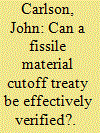

|
|
|
|
|
| Publication |
Jan-Feb 2005.
|
|
|
|
|
|
|
|
|
|
|
|
|
|
|
|
| 3 |
ID:
169456


|
|
|
|
|
| Summary/Abstract |
Researchers have recently proposed a new approach to nuclear-arms-control verification, dubbed “deferred verification.” The concept forgoes inspections at sensitive nuclear sites and of nuclear weapons or components in classified form. To implement this concept, a state first divides its nuclear program into a closed segment and an open segment. The total fissile-material inventory in the closed segment, which includes the weapon complex, is known and declared with very high accuracy. Essentially no inspections take place in the closed segment. In contrast, inspectors have access to the open segment, which includes in particular the civilian nuclear sector. The fissile-material inventory in the open segment is known with less accuracy, but uncertainties can be reduced over time using nuclear-archaeology methods. Deferred verification relies primarily on established safeguards techniques and avoids many unresolved verification challenges, such as the need for information barriers for warhead confirmation measurements. At the same time, deferred verification faces some unique challenges. Here, we explore some of these challenges and offer possible solutions; to do so, we examine possible noncompliance strategies in which a state would seek to withhold a higher-than-declared inventory.
|
|
|
|
|
|
|
|
|
|
|
|
|
|
|
|
| 4 |
ID:
086468
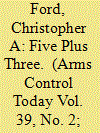

|
|
|
|
|
| Publication |
2009.
|
| Summary/Abstract |
The Obama administration has stated its intention to conclude a treaty cutting off production of fissile material, highly enriched uranium (HEU) and plutonium, for nuclear weapons. So did the administrations of George W. Bush and Bill Clinton. Although a fissile material cutoff treaty (FMCT) has been a key objective of the UN Conference on Disarmament (CD) for many years, that organization seems unable to break out of its now customary paralysis.[1] This experience should encourage the Obama administration, if indeed it wants such a treaty, to look to another forum for realization. More importantly, it may be vital for the new U.S. administration to take a different approach because pursuit of an FMCT as currently contemplated at the CD might well have the ironic and presumably unintended consequence of gravely undermining the nuclear nonproliferation regime. Fortunately, such a new approach may well be available.
|
|
|
|
|
|
|
|
|
|
|
|
|
|
|
|
| 5 |
ID:
079943
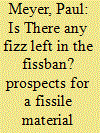

|
|
|
| 6 |
ID:
147848
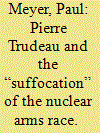

|
|
|
|
|
| Summary/Abstract |
Prime Minister Pierre Trudeau is known for his challenge to Canada’s NATO policy at the beginning of his tenure in power and his peace initiative at its end. Less well known is his support for innovative arms control policies designed to eliminate the technological impetus behind the nuclear arms race between the US and the USSR during the Cold War. At the first UN Special Session on Disarmament in May 1978, Trudeau delivered a speech outlining a “strategy of suffocation” that provided a novel package of four arms control measures that, taken as a whole, would represent an effective means of halting and eventually reversing the nuclear arms race. Although the superpowers were largely indifferent to them, these ideas helped spur the Department of External Affairs to invest in developing the institutional capacity to enable Canada to play a leadership role in future disarmament diplomacy.
|
|
|
|
|
|
|
|
|
|
|
|
|
|
|
|
| 7 |
ID:
095269
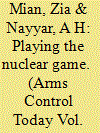

|
|
|
|
|
| Publication |
2010.
|
| Summary/Abstract |
Since May 2009, Pakistan, largely alone, has blocked the start of international talks on a fissile material cutoff treaty (FMCT) at the 65-member Conference on Disarmament (CD) in Geneva.[1] The treaty would ban the production of fissile materials for weapons purposes; fissile materials, namely plutonium and highly enriched uranium (HEU), are the key ingredients in nuclear weapons. Pakistan has prevented these negotiations despite having accepted last year a CD program of work that included an FMCT.
|
|
|
|
|
|
|
|
|
|
|
|
|
|
|
|